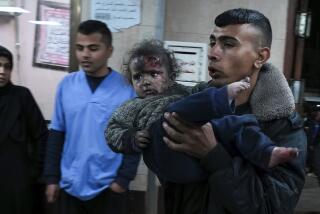Residents See Clampdown in Capital as Business as Usual
BAGHDAD — On the first day of a highly publicized security crackdown, Iraqi police and soldiers fanned out across the capital, manning new and existing checkpoints and enforcing a 9 p.m. curfew in an effort to counter the perception that Baghdad is sliding into chaos.
But the security forces deployed throughout the capital Wednesday did not appear to take any extraordinary or novel measures to curtail vehicle traffic or remove weapons from the city. As in the past here, police and soldiers at some checkpoints in volatile west Baghdad had their helmets off, relaxing in the shade of nearby palm trees as cars whizzed by unimpeded.
In the violence-racked Sadiya neighborhood, which has become a caldron of sectarian tensions between Sunni Arabs and Shiites, a resident who asked to remain unnamed said there appeared to be a smaller number of checkpoints staffed by fewer soldiers than in recent months.
Merchant Mustafa Husam said there appeared to be no beefed-up security presence in his neighborhood either.
“I was expecting something different today, like massive forces roaming our streets,” said Husam, referring to the Sunni Muslim-dominated Amiriya district, which has been considered a stronghold for insurgents.
“But there were only a few checkpoints on our main road. There were even some concrete barriers that were removed today.”
Prime Minister Nouri Maliki, attempting to build on a sense of hope spurred by the killing last week of militant insurgent leader Abu Musab Zarqawi and the completion of the Iraqi Cabinet, announced the security plan Tuesday during a surprise visit by President Bush.
Maliki formally took over the premiership of this violenceravaged country last month, pledging to stanch the intensifying violence between the country’s disparate ethnic and religious groups.
Security woes that have psychologically and economically drained the nation have been his primary concern, as they were for the interim Iraqi governments that followed the 2003 U.S.-led invasion that toppled President Saddam Hussein.
More so than his predecessor and fellow Shiite Muslim, Ibrahim Jafari, Maliki has been willing to make conciliatory gestures toward the more moderate elements in the Sunni Arab-led insurgency.
Maliki said Wednesday that he would announce a “reconciliation plan” today that “contains a door to talk with the armed groups that opposed the political process and now want to get back to politics.”
Maliki and his newly appointed security ministers, during public appearances, also took pains to emphasize that the new security measures would respect human rights and not target specific neighborhoods, thereby acknowledging fears by Sunni Arabs that any crackdown by security forces dominated by the ruling Shiites and infiltrated by Shiite political militias would target their communities.
The security plan “is not against a particular group of people,” Maliki told reporters. “It is not against particular regions.”
An Interior Ministry source in Baghdad said that Sunni Arab lawmaker Mohammed Daeni, visiting detention facilities in the Baqubah area, had videotaped inmates alleging rape and torture in a government-run prison. The tapes have been aired in recent days on Arabic news channels, fueling worries about the security forces’ regard for human rights.
Maliki, in addition to saying he would crack down on “terrorists,” publicly urged Iraqi security forces to exercise restraint as the plan was implemented throughout the capital and other parts of the country.
“We are asking our security people to respect human rights and not attack innocents,” he said. “The Baghdad security plan is the beginning for other security plans all over the country.”
But Maliki and his security ministers, the latter appointed last week on the day Zarqawi’s death was announced, revealed few details about the plan, other than to say they would increase the security presence on the streets and conduct more raids, and to emphasize initial efforts to safeguard Baghdad.
“The operations that will be conducted, especially the counter-terrorist operations and urban fighting, must be very classified in order to surprise the terrorists,” Defense Minister Abdul-Qader Mohammed Jassim Mifarji said.
“Otherwise they will change their style and locations.”
On the first day of the crackdown, there appeared to be less violence in the capital than on recent days.
Other than a car bomb that killed one person and injured 10 in western Baghdad and gunfights in the northern district of Adhamiya, there were no significant reports of violence in the capital.
But past security crackdowns that have included vehicle bans and additional forces have also been able, temporarily, to stifle violence in Baghdad, often at the cost of drastically curtailing the city’s civic and commercial life.
Elsewhere in Iraq on Wednesday, violence continued unabated. Clashes between armed men and security forces in Baqubah, a provincial capital about 35 miles northeast of Baghdad, erupted for a second day, with fighting breaking out in the city’s downtown. At least four Iraqis have died in the violence there. Also Wednesday, gunmen in Muqdadiya, about 25 miles northeast of Baqubah, shot dead a municipal worker.
In the southern city of Basra, assassins killed Qasim Yaqoub, head of the local university’s engineering department and a member of a Sunni Arab political party.
*
Times staff writers Zainab Hussein, Caesar Ahmed, Shamil Aziz and Mohammed Arrawi in Baghdad and a special correspondent in Baqubah contributed to this report.
More to Read
Sign up for Essential California
The most important California stories and recommendations in your inbox every morning.
You may occasionally receive promotional content from the Los Angeles Times.










